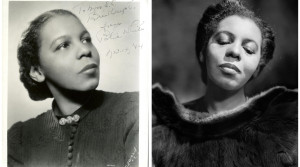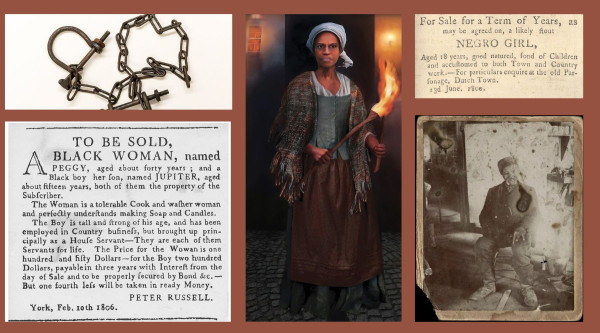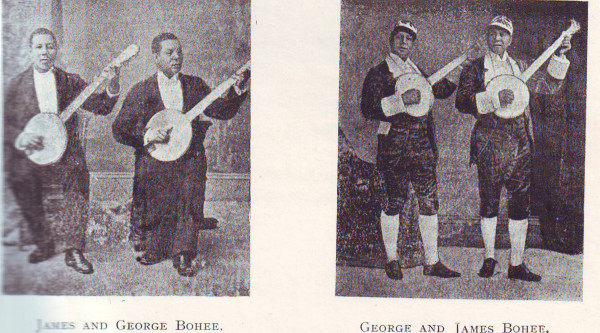Not much information is available on his exact escapades, but most have been documented in newspaper clippings and archival pieces. His life has been portrayed in books and on television, and now it’s on the main stage.
Come Home —The Legend of Daddy Hall is a play that will be presented at Tarragon Theatre until June 9th 2024. Written by Audrey Dwyer and staged by artistic director Mike Payette, it will treat Hall’s life in a contrasting way. Don’t expect the usual chronological storytelling.
John ‘Daddy’ Hall’s life was complex and triumphant. He survived war, slavery, and captivity (twice over) to later become the town crier in 19th century Owen Sound, Ontario. His nickname “Daddy” is said to have derived from his charming personality and the fact that he fathered up to 21 children. At the time of his death at the age of 117 or 118, he was noted to have five or six wives.
Dwyer says she was intrigued that his charm may have gotten him a foot forward anywhere he was. “When I read that he had multiple wives and multiple children, I had a moment and thought, ‘This guy must have been very charming.’
"In my research I found a photograph of him, and I saw that he had a twinkle in his eye. So, I thought, with all of these obstacles, how amazing was it that he was able to find family, fall in love, and have connections with these women, who in turn loved him? What I was really inspired by was that he was able to form connections with the people he was surrounded by,” says Dwyer.
Hall was born free from an escaped-slave mother and Ojibwe father and was said to have been born around 1783 near Amherstburg, Ontario. As a youth, he lived with Indigenous poeple on Walpole Island and an adjacent island. While there, he adopted the nickname of “Shoho-ho-hone” or Big Smoke from his tribe.
As an adult, he was a free man and fought in the War of 1812, serving as a scout for the British under renowned Indian Chief Tecumseh. Torn from his family by Virginian soldiers, and brought to the United States, Hall spent approximately 13 years in bondage in Kentucky and Virginia. But his resilience would not let him stay complacent. Eventually, Hall escaped slavery by swimming the Ohio River. He then migrated to Toronto, setting himself up by the Humber River. He lived peacefully off of the land as a squatter where he fished, farmed and made Indian Bark wood for a living.
While in Toronto, the rebels raided Hall’s home, and he was captured and taken prisoner on December 5, 1837. Forced to serve in the Rebellions of 1837-38 (the Upper and Lower Canada Rebellions), Hall acted as William Lyon Mackenzie’s guide under Captain Fuller of London.
Hall is known as the first Black person to settle at Sydenham Village near Owen Sound in 1843. In 1850, he lived in the north end of Victoria Park, known then as the Pleasure Grounds. He also became Owen Sound’s town crier and a well-liked and revered community figurehead.
His time in Owen Sound speaks to the resilience and hardiness of Black people. To such an extent, Dwyer feels that it mirrors much of what we as a people continue to endure today: how we deal with societal pressures, how we engage with one another, and how we love up on those close to us.
“The deeper I dug, the more I learned about his connection to his family, and his connection to love for over possibly 117 years of living. When we think about our elders, there’s so much about John Hall that reminds me of my family and my friend’s families—it’s just amazing,” says Dwyer.
Dwyer maintains that she sees Hall as an inspirational figure—someone who endured the roughest climates, yet persevered to become a well-respected member in Grey County’s African-Canadian community. “He went through so much and never gave up,” says Dwyer. “He was stolen from his home and his family, and he was enslaved…escaped and survived enslavement. He came back to Canada, built a family there and fought in the War of 1812..and was enslaved yet again…so he never lost his spirit, he never lost his drive, and he never lost the desire to fight for his rights,” says Dwyer.
Dwyer’s ‘why’ is intertwined with her curiosity and shock about why we collectively don’t know more about Hall’s life and why he’s not already a prominent topic of discussion. This became part of her catalyst for presenting his spirited story to the stage.
Today, Hall has an interpretive plaque erected by the City of Owen Sound in Local Heroes Square at City Hall. It reads, “Veteran of the War of 1812/Escaped Slave and Town Crier.”
Come Home — the Legend of Daddy Hall runs May 14 until June 9th in the Tarragon Mainspace.

 By
By 








